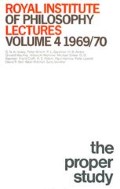Abstract
It is a pity that the question about the proper purpose of law has so often been formulated in terms of ‘the enforcement of morals’. Not only is that issue highly charged with emotion, but the sense of the expression is unclear and, taken in any ordinary sense, its importance is marginal. What Lord Devlin seems chiefly to be arguing, when he supports the enforcement of morals, is that there are in any society certain central institutions which receive and deserve protection by law and that without such protection the society in question would disintegrate. His examples in our own society are monogamy and private property. It is true that these institutions are closely bound up with parts of our morality in two different ways: (a) certain moral prohibitions are defined in terms of them, e.g. adultery and theft; (b) a host of obligations is associated with them upon whose general acceptance and discharge their continuance depends. But it is only in an extended sense that one could describe the institutions themselves as parts of the common morality. It is possible, therefore, to hold that the law may properly be used to protect such institutions without necessarily taking the further step of maintaining that their protection requires and justifies legal prohibition of acts which offend against the associated morality.
Access this chapter
Tax calculation will be finalised at checkout
Purchases are for personal use only
Preview
Unable to display preview. Download preview PDF.
Notes
Republic of Kenya, Report of the Commission on the Law of Marriage and Divorce (Nairobi, 1968).
Nadel, Anthropology and Modem Life, Inaugural Lecture Australian National University (Canberra, 1953); quoted by
D. Emmet, Rules, Roles and Relations (London, 1966) p. 27.
‘The degree of anomie in a social system is indicated by the extent to which there is lack of consensus on norms judged to be legitimate, with its attendant uncertainty and insecurity in social relations‘ (my italics). G. Rose, ‘Anomie, and Deviation —A Conceptual Framework for Empirical Studies’ (British Journal of Sociology, 1964) quoted in
Sociology, Theology and Conflict, ed. D. E. H. Whiteley and R. Martin (Oxford, 1969) p. 21.
Copyright information
© 1971 The Royal Institute of Philosophy
About this chapter
Cite this chapter
Mitchell, B. (1971). Law and the Protection of Institutions. In: The Proper Study. Royal Institute of Philosophy Lectures. Palgrave Macmillan, London. https://doi.org/10.1007/978-1-349-81581-4_13
Download citation
DOI: https://doi.org/10.1007/978-1-349-81581-4_13
Publisher Name: Palgrave Macmillan, London
Print ISBN: 978-1-349-81583-8
Online ISBN: 978-1-349-81581-4
eBook Packages: Palgrave History CollectionHistory (R0)

